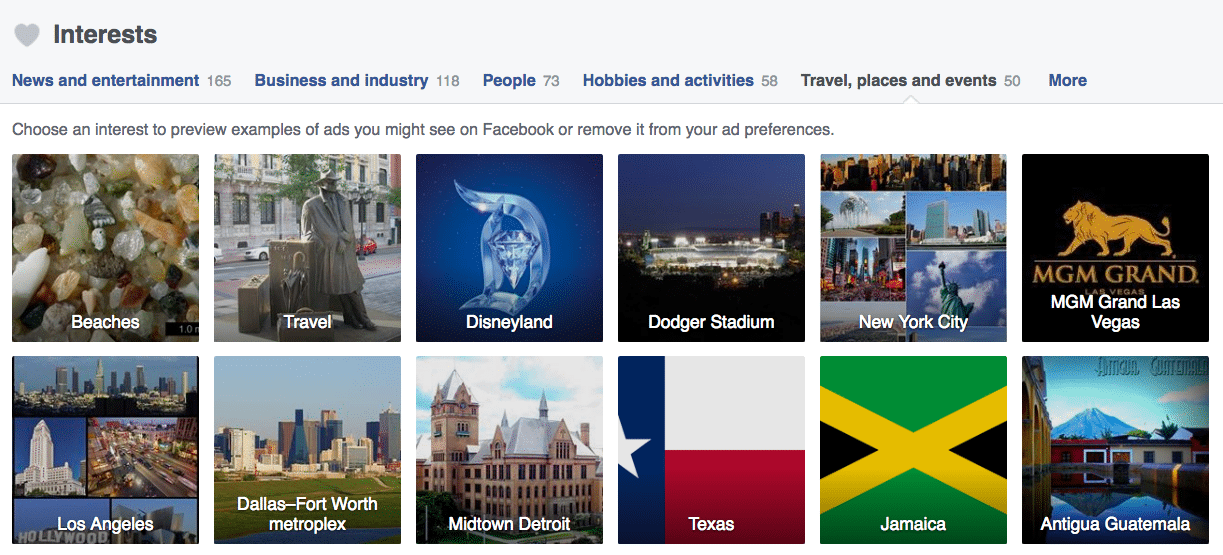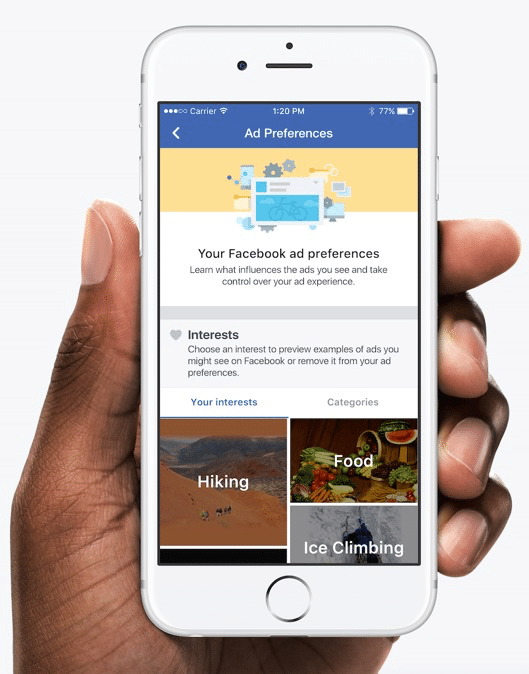Skift Take
It couldn't be more clear that Facebook wants its users to see the highest quality and most relevant content possible and its latest ad preferences update could have big implications for travel brands that both serve compelling and uninspiring ads to consumers. Meanwhile, Expedia and Priceline are seeing a lot of success with Facebook and are both upping their spend.
Facebook will keep serving ads to consumers but the company is introducing new ad preferences for users’ News Feeds that gives travelers more power over what kinds of ads they see from brands.
This week Facebook updated ad preferences with images that users can tap to indicate whether they want to see ads from a particular interest area, including travel. Facebook wants ads to be a part of its News Feed customization efforts, enabling users to see ads tailored to their interests. That’s good for users and potentially more effective for brands.
Tapping on a travel image in ad preferences will expand categories under that category and help travelers decide if they’re interested in seeing related topics such as hiking, food, ice climbing. Users who have added travel preferences can opt out of seeing ads from specific businesses or organizations.
What The update means for Travel brands
The ad preferences’ update helps travel brands identify Facebook users clearly interested in travel or who are planning a trip to a particular destination. Visit New Hampshire, which uses several Facebook ad products, said the update will help it layer in behavioral targeting for users interested in New Hampshire with travel intent.
A Facebook spokesperson says this update, which began rolling out on August 9 on iPhone, Android and desktop browsers (see featured image for desktop), is already available to “a large percentage of Facebook users” and will roll out worldwide throughout August.
It’s important to note, however, that while selecting travel and specific brands as an interest certainly boosts the chances of a travel-related ad or brand-specific ad being served to a user, Facebook doesn’t guarantee it.
On the other hand, a Marriott ad could still show up in travelers’ News Feeds even if they indicated that they don’t prefer to see travel or hotel ads, for example. Facebook’s new ad preferences, or “Interests” as the company calls them, are more like guidelines to help Facebook and brands understand what users are interested in but the preferences don’t become strict rules.
As Facebook rolled out its new ad preferences it separately began blocking ad blockers, The New York Times reported. So Facebook’s ad preferences obviously aren’t benign: The site gives users more options to view ad categories they are interested in but if they abhor advertising in general they aren’t going to be equipped to use tools to block them out altogether.
Facebook’s Advertising Evolution
This update follows Facebook’s release of its Dynamic Ads product in May with Marriott International and Trivago as two of its launch brands. Dynamic Ads allow brands to target consumers on Facebook as they move from site to site and across multiple devices and as they switch from desktop to mobile and back again.
Marriott Hotels, for example, could serve an ad for a hotel in Los Angeles that shows up-to-the-minute availability and rates to users who have expressed interest in traveling to Los Angeles during specific dates.
The Facebook’s advertising portfolio is evolving. In May, Visit New Hampshire began running Facebook’s new Canvas ads, which the organization said is all about brand immersion for them on mobile devices.
Canvas combines video, still images and call-to-action buttons into a single ad product and travelers can swipe through a carousel of images, tilt to view panoramic images and zoom in to view images in detail. Carnival Corp. and Universal Orlando Resort are two other travel brands that use Canvas ads, according to Facebook.
“Our canvas ads, such as one that shows nine New Hampshire mountain biking trails, make the consumer feel like they’re part of the action,” said Visit New Hampshire. “It’s raw footage so as you’re watching the video in the ad you feel like you’re actually riding the bike.”
The destination marketing organization still uses Facebook Carousel ads but wanted to tell a different story that isn’t as practical with that product. It’s trying to reach Gen X moms and millennials in the New Hampshire drive markets with its Canvas ads. What’s interesting is that in the mountain biking ad (see video of the ad below) there is no booking button visible.
“Booking isn’t brought in right away because we want to peak interest to show all activities in New Hampshire and then the next step is to get travelers to book,” said a spokesperson for Visit New Hampshire. “Facebook is just one piece of the puzzle for us.”
Expedia’s Spending on Facebook Ads up significantly
Facebook is an increasingly important piece of the puzzle for Expedia, Inc. and the Priceline Group.
Expedia Inc. CEO Dara Khosrowshahi said the company’s spending on Facebook ad products, particularly with its Trivago hotel-metasearch division, is up significantly and that he sees a lot of potential in the platform. “As far as Facebook, and the Dynamic Ads go, we’re experimenting and really starting to scale up with Facebook across our brands on a global basis,” he said during the company’s second quarter earnings call July 28.
“The spend there is now getting to real significance. And our engineering teams have been working with the Facebook engineering teams in a very productive way. And basically all of the brands are experimenting with Facebook and finding veins, traffic and conversion veins that are awfully interesting. So our spend is up significantly. It looks like it’s working and we think that the momentum there will continue. You certainly see it in the Facebook results.”
Khosrowshahi wouldn’t comment on how scaling up ad dollars on Facebook is impacting the company’s return on investment, “We’ve got a bunch of data scientists looking at the return and we would not be scaling up our spend on Facebook unless it was getting us more than satisfactory results. We will look to maximize spend on an affordable basis in any variable channel which includes Google, includes metasearch and now, more and more, it’s including Facebook as well.”
Priceline Group CEO Likes Facebook Retargeting
The Priceline Group’s interim CEO Jeffery Boyd is also pleased with how Facebook is performing for the group, “I think we would like to spend more money on Facebook going forward,” said Boyd during the company’s second quarter earnings call August 5. “We have a good relationship with them, and we’ve found that a number of things that we’ve done on Facebook works well, particularly retargeting, which really is more of a performance-based analysis the way we look at it.
Boyd wouldn’t comment specifically on Dynamic Ads but said to expect the company to do much more with Facebook in the future, “As you could see by Facebook’s announcement, the scale of their advertising business is growing, and while it traditionally has been more of a brand advertising platform, we like to work closely with Facebook to find ways to make more performance-oriented placements work for us. And that’s something that we continue to be interested in doing.”
The Daily Newsletter
Our daily coverage of the global travel industry. Written by editors and analysts from across Skift’s brands.
Have a confidential tip for Skift? Get in touch
Tags: advertising, facebook, social media
Photo credit: Facebook's new ad preferences as they appear on its desktop site. Facebook rolled out new ad preferences this week that give users more control over what ads they see. Facebook

